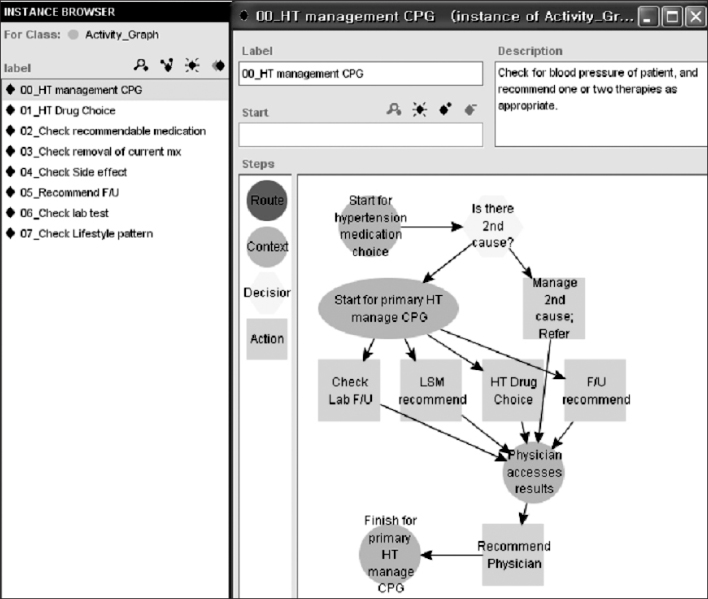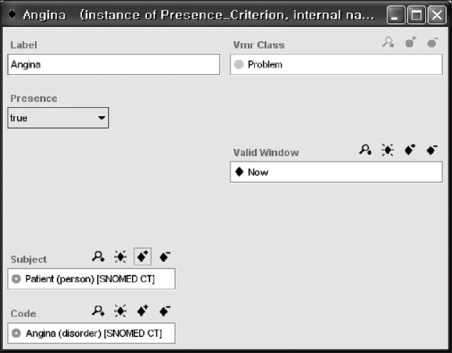J Korean Soc Med Inform.
2009 Dec;15(4):445-453.
Evaluation of Knowledge Model for a Hypertension Management CDSS Using a Standard-based Knowledge Authoring Tool
- Affiliations
-
- 1R&D Center for Interoperable EHR, Korea. kijii90@snu.ac.kr
- 2Department of Nursing, School of Medicine, Inha University, Korea.
- 3Department of Health Policy and Management, College of Medicine, Seoul National University, Korea.
- 4Institute of Health Policy and Management, Seoul National University Medical Research Center, Korea.
Abstract
OBJECTIVE
For the development of interoperable and sharable knowledge-based clinical decision support systems, it is important to evaluate the appropriateness of knowledge in each phase. In this study, an evaluation of early phase's knowledge model for hypertension management was conducted to develop a more precise and useful knowledge model. METHODS: The knowledge model for hypertension management based on JNC7 was modeled using a knowledge representation tool based on SAGE. Two physicians were involved in evaluating the process of the knowledge model. They reviewed 36 scenarios and made recommendations based on the knowledge model. These recommendations were compared with those derived from the model. RESULTS: Eight algorithms and 223 evidence statements were included in the knowledge model. The concordance rate of the recommendations between the physicians and the model for the goal BP were 61% and 93% by the respective physicians. Six scenarios showed low proficiency and efficiency for drug recommendation. Two refinements of the knowledge model were made based on the results. CONCLUSION: The evaluation process of the knowledge model in the early phase provides more precise and useful knowledge model in the next.
Figure
Reference
-
1. Tu SW, Campbell JR, Glasgow J, Nyman MA, McClure R, McClay J, et al. The SAGE guideline model: achievements and overview. J Am Med Inform Assoc. 2007. 14:589–598.
Article2. Peleg M, Tu SW, Bury J, Ciccarese P, Fox J, Greenes RA, et al. Comparing computer-interpretable guideline models: a case-study approach. J Am Med Inform Assoc. 2003. 10(1):52–68.
Article3. Kaiser K, Miksch S. Modeling computer-supported clinical guidelines and protocols. 2005. Vienna University of Technology.4. Tu SW, Campbell JR, Musen MA. SAGE guideline modeling: motivation and methodology. Stud Health Technol Informm. 2004. 101:167–171.5. Peleg M. Greenes R, editor. Guidelines and workflow models. Clinical decision support; The road ahead. 2007. 1st ed. Oxford UK: Academic Press;281–306.
Article6. Peleg M, Gutnik LA, Snow V, Patel VL. Interpreting procedure form descriptive guidelines. J Biomed Inform. 2006. 39:184–195.7. Sailors RM, East TD, Wallace DJ, Carlson DA, Franklin MA, Heermann LK, et al. Testing and validation of computerized decision support systems. Proceedings of the AMIA Annual Symposium. 1996. 234–238.8. Martins SB, Lai S, Tu SW, Shankar R, Hastings SN, Hoffman BB, et al. Offline testing of the ATHENA hypertension decision support systems knowledge base to improve the accuracy of recommendations. Proceedings of the AMIA Annual Symposium. 2006. 539.9. Choj J, Bakken S. Creation of a gold standard for validation of a computer-interpretable depression screening guideline. Stud Health Technol Inform. 2006. 122:95–99.10. Jenders RA, Corman R, Dasgupta B. Making the standard more standard: a data and query model for knowledge representation in the Arden syntax. Proceedings of the AMIA Annual Symposium. 2003. 323–330.11. Shiffman RN, Michel G, Essaihi A, Thornquist E. Bridging the guideline implementation gap: a systematic, document-centered approach to guideline implementation. J Am Med Inform Assoc. 2004. 11(5):418–426.
Article12. Peleg M, Boxwala AA, Tu SW, Zeng Q, Ogunyemi O, Wang D, et al. The InterMed approach to sharable computer-interpretable guidelines: a review. J Am Med Inform Assoc. 2004. 11:1–10.
Article13. Musen MA, Tu SW, Das AK, Shahar Y. EON: a component-based approach to automation of protocol-directed therapy. J Am Med Inform Assoc. 1996. 3(6):367–388.
Article14. Johnson PD, Tu SW, Booth N, Sugden B, Purves IN. Using scenarios in chronic disease management guidelines for primary care. Proceedings of the AMIA Annual Symposium. 2000. 389–393.15. Boxwala AA, Peleg M, Tu SW, Ogunyemi O, Zeng QT, Wang D, et al. GLIF3: a representation format for sharable computer-interpretable clinical practice guidelines. J Biomed Inform. 2004. 37(3):147–161.
Article16. Dunsmuir D, Daniles J, Brouse C, Ford S, Ansermino JM. A knowledge authoring tool for clinical decision support. J of Clinical Monitoring and Computing. 2008. 22:189–198.
Article17. Cho I, Kim J, Lee E, Kim S, Lee J, Kim Y. Approach to the requirements of a decision support system for hypertension management in a health center. J Kor Soc Med Informatics. 2007. 13(3):259–269.
Article18. The seventh report of the joint national committee on prevention, detection, evaluation, and treatment of high blood pressure, JNC7. 2004. National Institutes of Health.19. Henry SB, Lebreck DB, Holzemer WL. The effect of verbalization of cognitive processes on clinical decision support making. Res Nurs Health. 1989. 12(3):187–193.
Article20. Tu SW, Musen MA. Representation formalism and computational methods for modeling guideline-based patient care. Proceedings of the First European Workshop on Computer-based Support for Clinical Guidelines and Protocols. 2000. 115–132.21. Mumpower JL, Stewart TR. Expert judgement and expert disagreement. Thinking and Reasoning. 1996. 2(2/3):191–211.
Article22. Chan AS, Coleman RW, Martins SB, Advani A, Musen MA, Bosworth HB, et al. Evaluating provider adherence in a trial of a guideline-based decision support system for hypertension. MedInfo 2004. Proceedings of the 11th World Congress on Medical Informatics. 2004. Amsterdam; Netherlands: 125–129.
- Full Text Links
- Actions
-
Cited
- CITED
-
- Close
- Share
- Similar articles
-
- Integration and Evaluation of Clinical Decision Support Systems for Diagnosis Idopathics Pulmonary Fibrosis (IPF)
- The Adoption of Electronic Medical Records and Decision Support Systems in Korea
- Implementation of Ontology-based Clinical Decision Support System for Management of Interactions Between Antihypertensive Drugs and Diet
- Factors Influencing the Self-management Behaviors of the Elderly with Hypertension in the Local Community
- Development an Evaluation Tool for Evaluation of Hypertension Prevention and Management Program in Community Health Posts





